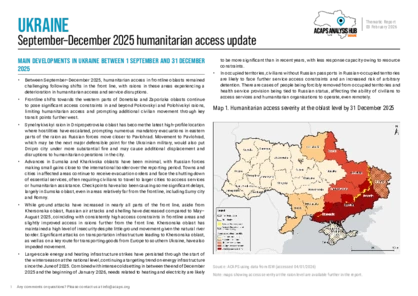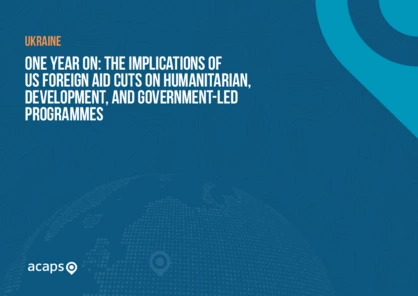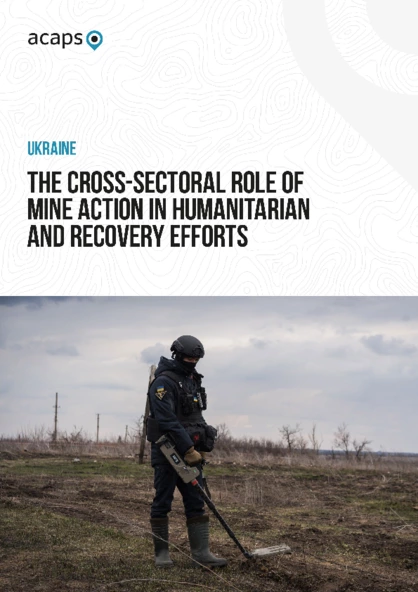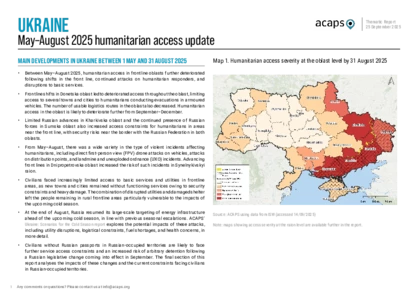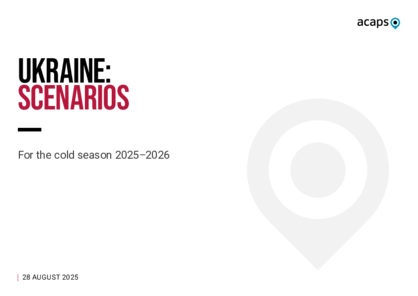Latest updates on country situation
20 January 2026
On 19 January 2026, Russian missile and drone strikes caused power, heating, and water outages for at least 5,600 high-rise buildings in Kyiv amid prolonged deep frost conditions and temperatures as low as −15° C. Russia's campaign against Ukraine's energy infrastructure, averaging more than 36 attacks per week nationwide, is among the highest levels since February 2022, affecting Chernihivska, Dnipropetrovska, Donetska, Kharkivska, Kyivska, and Odeska oblasts and Kyiv city the most. Ukraine faces a 40% power capacity deficit nationwide, with only 11GW available of the 18GW required. In response to the worsening crisis, the Ukrainian Government, for the first time, has declared a national energy emergency and is supporting civilians with charging stations, warmth, hot drinks, and psychosocial support. That said, repeated blackouts, limited heating, and prolonged cold exposure may overwhelm services, worsen winter-related health conditions, and increase vulnerability, especially among older adults and children. ACLED accessed 15/01/2026, UNICEF 16/01/2026, Ukrinform 20/01/2026)
11 December 2025
Russian forces struck a Kherson thermal power station on 3 December 2025 with over 100 weapons, including drones and artillery, severely damaging equipment and halting operations. Repairs are impossible owing to security risks. Around 40,000 residents in 470 apartment buildings have lost heating, while those in the Dniprovskyi, Korabelnyi, and Tsentralnyi raions already face limited heating, electricity, gas, and water. These outages and insufficient household heating increase risks of winter illnesses and restrict access to essential food and water. (WHO 05/12/2025, Interfax 06/12/2025, Suspilne 25/11/2025)
10 November 2025
From 7–8 November 2025, Russian forces launched 45 missiles and 458 drones targeting Ukraine’s energy infrastructure countrywide. The attack targeted several types of energy facilities, including the thermal power plants and substations that power the Khmelnytskyi and Rivne nuclear power plants. The attack disrupted electricity, heating, and water supplies in several cities and led to prolonged power outages that lasted between 8–16 hours across most of the country. (Ukrainska Pravda 08/11/2025, TKI 08/11/2025, The Guardian 09/11/2025)
24 October 2025
On 22 October 2025, Russian forces launched 405 drones and 28 missiles targeting energy infrastructure in Cherkaska, Chernihivska, Kirovohradska, Kyivska, and Odeska, Poltavska oblasts and Kyiv city, causing civilian casualties and triggering emergency power cuts. This comes after three recent waves of attacks on energy infrastructure on 5, 10, and 16 October caused similar impacts in Kyiv city and Cherkaska, Chernihivska, Dnipropetrovska, Donetska, Kharkivska, Kyivska, Odeska, Poltavska, and Sumska oblasts. These attacks signal a renewed Russian campaign targeting Ukraine's energy system heading into the 2025–2026 cold season. (Ekonomichna Pravda 22/10/2025, LB 22/10/2025, Suspilne 10/10/2025)
23 September 2025
The water crisis resulting from inadequate water infrastructure in the Russian-occupied territories of Donetska oblast continues to worsen in late 2025. The Siverskyi Donets–Donbas Canal, which serves four million people even after facing damage since the conflict in 2014, has faced increased war-related damage since 2022. Damages to the canal system heightened by strikes on energy infrastructure and a summer drought are limiting water access for civilians who face increased health risks and utility costs. Low water reservoir levels risk reducing the operational capacity of the Zuivska thermal power plant, potentially limiting access to heating during the coming cold season for one-third of people. (Ekonomichna Pravda 17/07/2025, The Insider 25/08/2025, ISW 28/08/2025)
19 August 2025
Between 10–14 August 2025, Russian sabotage groups advanced 10–12km past the front lines east of Dobropillia. New mandatory evacuations were announced, with the remaining population facing constrained access to essential services. From 13–14 August, mandatory evacuations were announced from Bilozerska and Dobropilska hromadas in Pokrovskyi raion and Andriivska hromada in Kramatorskyi raion, where a total of 3,000 children remained. The use of first-person-view drones by the Russian forces further complicates evacuation measures, as they present a high risk to civilians, evacuees, and humanitarian responders directly involved in life-saving evacuation. Increased pressure on the nearest transit centre in Pavlohrad city, Dnipropetrovska oblast, is compounded by the overall lack of collective shelter spaces for evacuees. People who remain in frontline areas generally face more severe needs given diminished essential services and humanitarian response, with older people, people with disabilities, and those with reduced mobility at particular risk of having unmet needs. (Vchasno 15/08/2025, REACH 26/03/2025, (ISW 15/08/2025)
13 August 2025
On 2 August 2025, Russian forces attacked the road bridge connecting Korabelniy microdistrict of Kherson with the rest of the city, causing gas, power, and water disruptions. By 10 August, 1,565 civilians (nearly 87% of Korabelniy's total population), including 56 children and 152 individuals with low mobility, had been evacuated. The humanitarian situation in Kherson continues to deteriorate as Russian forces target the roads and vehicles that humanitarians use for evacuation and the delivery of assistance. (Ukrinform 07/08/2025, Ukrainska Pravda 10/08/2025,
Interfax 12/08/2025)
current crises
in
Ukraine
These crises have been identified through the INFORM Severity Index, a tool for measuring and comparing the severity of humanitarian crises globally.
UKR002 - Conflict in Ukraine
Last updated 31/01/2026
Drivers
Conflict/ Violence
Crisis level
Country
Severity level
4.3 Very High
Access constraints
5.0
Analysis products
on
Ukraine
03 February 2026
Ukraine: September–December 2025 humanitarian access update
DOCUMENT / PDF / 2 MB
This report compares access challenges across Ukrainian raions and oblasts to inform humanitarian responders and support decision-making. It is part of ACAPS’ regular analysis of access constraints, with the latest report published on 25 September 2025.
31 December 2025
Ukraine: the implications of US foreign aid cuts one year on
DOCUMENT / PDF / 3 MB
This report provides an updated analysis of the shifting foreign assistance landscape in Ukraine, with a focus on clarifying known impacts to humanitarian, development, and government programmes nearly one year since the US foreign aid freeze.
Attached resources
12 December 2025
Ukraine: the cross-sectoral role of mine action
DOCUMENT / PDF / 4 MB
This analysis provides an overview of how mine action intersects with other humanitarian needs and its foundational role in recovery efforts in Ukraine. This report was requested by Demine Ukraine under the Ministry of Economy, Environment and Agriculture.
Attached resources
25 September 2025
Ukraine: May–August 2025 humanitarian access update
DOCUMENT / PDF / 2 MB
This report compares access challenges across Ukrainian raions and oblasts to inform humanitarian responders and support decision-making. It is part of ACAPS’ regular analysis of access constraints, with the latest report published on 8 May 2025.
Attached resources
28 August 2025
Ukraine: scenarios for the cold season 2025–2026
DOCUMENT / PDF / 650 KB
This report details four distinct yet plausible futures for Ukraine during the upcoming October 2025 to March 2026 cold season. The scenarios focus on how the intersection of war dynamics and seasonal conditions may drive distinct cold-season-related needs throughout the country.


